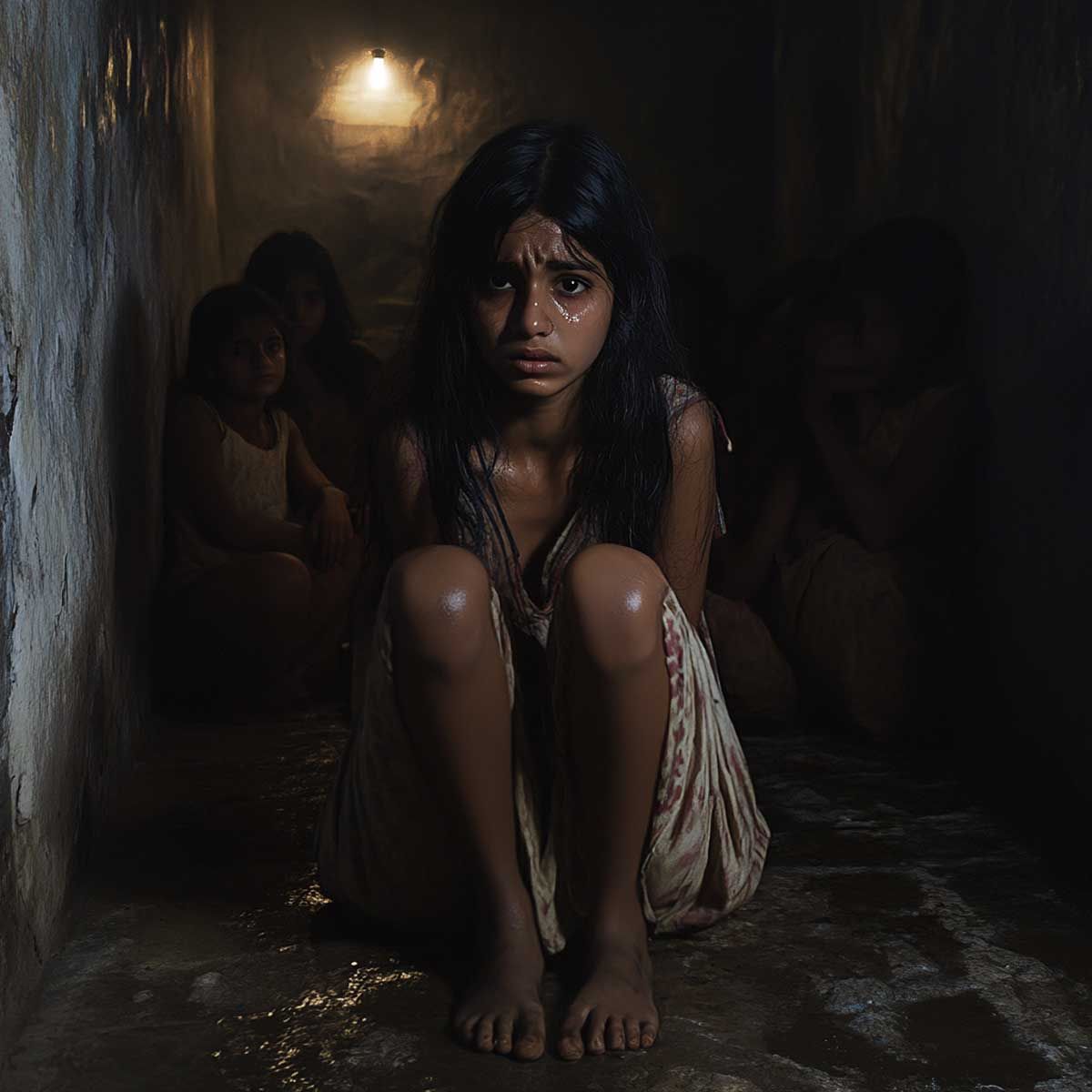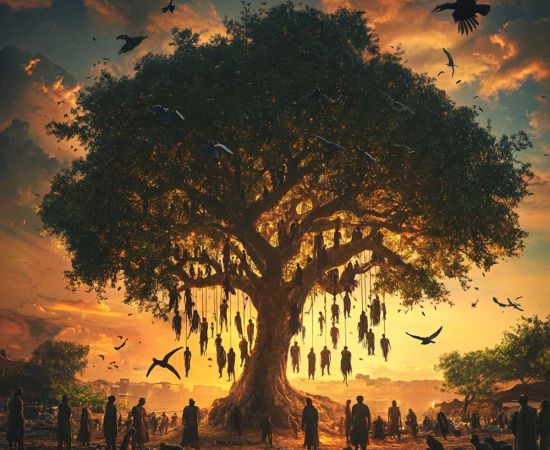MORE COVERAGE
Twitter Coverage
Satyaagrah
Written on
Satyaagrah
Written on
Satyaagrah
Written on
Satyaagrah
Written on
Satyaagrah
Written on
JOIN SATYAAGRAH SOCIAL MEDIA
"पिंजरा": In a chilling Delhi raid, 23 women including 3 minors—10 from Nepal—rescued from a Muslim-run sex trafficking racket in Paharganj; victims were lured, caged, and sold to hotels like meat, with accused Nurshed Alam, Mohammad & Abdul gang arrested

On Sunday, the Delhi Police shared some big news that left everyone talking—they had taken down a dangerous sex trafficking racket right in the heart of Paharganj. This wasn’t a small operation either; it happened after a carefully planned raid on Thursday that ended up saving 23 people, including three young girls who weren’t even adults yet. Alongside the rescues, they nabbed seven men who were allegedly running this dark and illegal business.
|
The whole effort came together thanks to hard work from different teams in the Central district police. They’d gotten a tip-off—a whisper about something shady going on, an organized prostitution network hiding in plain sight in Paharganj. That’s when they sprang into action. Harsha Vardhan, the Deputy Commissioner of Police (Central), explained the situation clearly: “It was alleged that the accused were bringing women from West Bengal, Nepal and other places in Delhi and keeping them in a house in Paharganj and later sending them to various hotels for prostitution.” Hearing this, it’s hard not to feel a chill thinking about how these women were trapped in such a nightmare.
Out of the 23 people rescued, the police pointed out that ten of them were from Nepal. That’s a big number, showing how this racket reached across borders. The DCP gave more details about how they pulled this off: “Based on surveillance and intelligence inputs about a trafficking racket in the Central district, our teams developed key information regarding locations of illegal activities.” It wasn’t just guesswork—the police had been watching, gathering clues, and piecing things together to figure out where this awful trade was happening.
The police didn’t just rush in blindly. They tracked how the victims were being moved around, often on scooters, to nearby hotels. To make sure they had the right spots, they sent in decoy customers—people pretending to be part of the racket’s clients—to check if the illegal stuff was really going on. Once they got the green light, the raids began. They hit multiple places, including a secret hideout house and several hotels, pulling out the victims and grabbing the suspects. Along with the rescues, they seized seven mobile phones and two scooters, which they say were used to keep this trafficking operation running smoothly.
|
This wasn’t a slap-on-the-wrist kind of case either. The police filed serious charges under the Immoral Traffic (Prevention) Act, hitting the accused with sections 3, 4, and 5. That means they’re being charged for running a brothel, living off the money made from prostitution, and tricking or forcing people into it. It’s a strong message that this kind of crime won’t be taken lightly.
The men they arrested have names and ages that paint a picture of who was behind this: Nurshed Alam, just 21 years old; Mohammad Rahul Alam, 22; Abdul Mannan, 30; Tausif Rexa; Shamim Alam, 29; Mohammad Jarul, 26; and Monish, 26. Young guys, mostly, caught up in something so wrong it’s hard to wrap your head around.
A senior police officer laid out how it all went down, saying: “Based on inputs and surveillance, police identified key locations involved in the illegal trade. The accused were allegedly luring women from West Bengal, Nepal, and other States under false pretences and forcing them into prostitution.” These women weren’t there by choice—they were lied to, brought to a room in the busy Paharganj main market area, and then shipped off to different hotels. The officer added more about the prep work: “Once the illegal activities were confirmed, teams raided multiple locations, including hotels. The victims were found being transported on scooters to different locations. The teams rescued 23 women, including three minors and arrested seven accused.” It’s heartbreaking to think of those scooters zipping through the streets, carrying people who had no say in where they were going.
The officer also made it clear this was a team effort: seven people running the trafficking were caught in a joint operation by the Paharganj Police Station, Shardanand Marg Police Outpost, and Himmatgarh Police Outpost. They’d been luring women from places like West Bengal, Nepal, and other states with fake promises—maybe jobs or a better life—only to push them into prostitution instead. The women were stashed in that room in the main market, a place you’d never suspect, before being sent out to hotels. Before the big move, the police watched closely, sent in those fake customers to suspicious spots, and only struck when they knew for sure what was happening. When they did, they hit hard, raiding hotels and other locations to bring those 23 women to safety.
This story isn’t just about a police bust—it’s about real people, caught in something terrible, and the effort it took to set them free. The Delhi Police put in the work, and now those seven men are facing the consequences. For the 23 women rescued, including those three minors, it’s a chance to start over, away from the shadows of Paharganj’s streets.
|
The Dark Legacy of "Kafir" and Sex Slavery in Islam
The term "kafir" in Islam—a word meaning non-Muslim—sounds innocent enough until you dig into what it’s meant for centuries. It’s not just a label; it’s a justification for some of the ugliest parts of Islamic history, especially the enslavement and sexual exploitation of women. Back in the 7th century, when Islam was born, calling someone a kafir could strip them of their freedom and dignity, turning them into property for Muslim conquerors. Worse still, the practice of keeping sex slaves—kafir women taken in war or bought like goods— wasn’t just allowed; it was celebrated as a right. And if you think this is all ancient history, look closer: echoes of this brutal mindset linger today in parts of the Muslim world, hiding behind religion or tradition.
"Kafir": A Word That Dehumanized
Let’s start with "kafir." In early Islam, it wasn’t just about someone not believing in Allah or the Prophet Muhammad—it was a way to mark people as less than human. Muslims saw themselves as the chosen ones, guided by divine truth, while kafirs were the outsiders, the infidels, the ones who didn’t matter. This wasn’t a quiet judgment; it was a battle cry. When Muslim armies swept across Arabia and beyond, kafirs were the enemy—people to be fought, killed, or enslaved. For women, being a kafir meant something even worse: a life where your body could be claimed by your captor.
This wasn’t some minor footnote. The Quran, Islam’s holy book, and the Hadith, the Prophet’s sayings, made it clear: kafirs were fair game. If you weren’t Muslim, you had no protection. Imagine living in a village, minding your own life, when a Muslim army rolls in. You lose the fight, and suddenly you’re not a person anymore—you’re a prize. For kafir women, that prize came with a sick twist: their new owners could use them for sex, and the religion said it was fine.
Slavery wasn’t new when Islam started—it was everywhere in Arabia, a cruel fact of life. But instead of ending it, Islam grabbed it with both hands and gave it a holy stamp. Muslims couldn’t enslave other Muslims, which sounds noble until you realize it just shifted the burden onto kafirs. Non-Muslims captured in war or bought from slave markets became the backbone of this system. Men were forced to work fields or fight; women were often turned into maids—or worse, sex slaves.
The Prophet Muhammad didn’t just allow this—he lived it. He took slaves, including women he slept with, setting a pattern his followers copied without blinking. The Quran backs this up, talking about “what your right hands possess”—a fancy way of saying slaves—and saying men could have sex with them alongside their wives. This wasn’t a suggestion; it was a rule. For kafir women, it meant their faith—or lack of it—doomed them to a life of rape dressed up as religious privilege.
|
Sex Slavery: A Disgusting Reality
Let’s not sugarcoat it: sex slavery in Islam was horrific. Picture a kafir woman—maybe a Christian, a Jew, or someone from a tribal faith—caught after her people lost a battle. She’s dragged away, terrified, and handed to a Muslim soldier. He doesn’t need her consent; he doesn’t even need to marry her. The Quran says she’s his, and that’s that. He can sleep with her whenever he wants, and if she gets pregnant, the kid might be free—but she’s still a slave unless he feels generous enough to let her go.
This wasn’t rare or hidden—it was normal. Muslim leaders, from the Prophet to the caliphs who followed, kept concubines, sometimes dozens of them. These weren’t love stories; they were power trips. A kafir woman’s body became a trophy, a way to show off victory over the infidels. The rules said owners should be “kind,” but kindness doesn’t mean much when you’re chained to someone else’s will. She might cook his meals, clean his house, and then be forced into his bed—all because she wasn’t Muslim.
|
The Excuses: War and Religion
Why was this okay? Islam’s defenders say it was just how war worked back then—everyone took slaves, and Islam was no worse. But that’s a weak excuse. Other cultures had slavery, sure, but Islam wrapped it in divine approval, making it harder to question. The Quran doesn’t just mention slaves; it endorses using them sexually, tying it to faith. Kafirs weren’t enslaved because they were unlucky—they were targeted because they didn’t believe. That’s not a byproduct of war; that’s a religious vendetta.
And it wasn’t just about war. Slave markets thrived in Muslim lands, selling kafir women from places like Africa or Europe to rich men who wanted concubines. These women weren’t all battle captives—some were kidnapped or sold by traders, yet the same rules applied. Their non-Muslim status made them disposable, their bodies a commodity blessed by scripture. It’s a sick twist: a religion claiming mercy and justice turned a blind eye to this cruelty.
|
The Human Toll
Think about the women caught in this. A kafir girl, maybe 15, watches her family die in a raid. She’s taken, sold, and ends up in a stranger’s house. She doesn’t speak his language, doesn’t know his rules, but she learns fast what he wants. Night after night, she’s forced to submit, her cries ignored because she’s just a slave—an infidel with no rights. If she has a child, it might grow up free, but she’s stuck, her life a cycle of labor and violation.
These weren’t faceless numbers—they were people. Mothers, daughters, sisters, ripped from their worlds and treated like objects. Some might’ve fought back, only to be beaten or killed. Others gave up, surviving in silence. The Quran says to treat slaves well, but “well” didn’t mean freedom or respect—it meant feeding them while keeping them under your thumb. For kafir women, it was a living hell, all because they didn’t pray the right way.
|
It’s Not Just History
Now here’s the ugly truth: this isn’t all in the past. Sure, slavery was officially banned in most Muslim countries by the 20th century, thanks to outside pressure and some internal reform. But the mindset—the idea that kafirs are lesser, that their bodies can be taken—still festers in dark corners. Look at groups like ISIS, who in the 2010s captured Yazidi women in Iraq and Syria. These weren’t Muslims, so ISIS called them kafirs and enslaved them, raping them under the banner of Islamic law. They quoted the same Quran verses, followed the same Prophet’s example, and said it was their right.
Even beyond extremists, it’s not hard to find stories today of women trafficked or exploited in Muslim-majority places, with old attitudes lurking underneath. In some Gulf countries, migrant workers—often non-Muslims from Asia or Africa—face abuse that echoes slavery, including sexual violence. The laws might say it’s illegal, but the culture, steeped in that kafir-slave history, sometimes looks the other way. It’s not chains and markets anymore; it’s hidden in homes, behind closed doors, but the root is the same: non-Muslims are still seen as less human by some.
This isn’t just outdated—it’s indefensible. A religion that claims to value dignity shouldn’t have a loophole for rape. Saying “it was normal then” doesn’t cut it; plenty of things were normal once, like human sacrifice, and we call them barbaric now. Islam could’ve ended slavery, could’ve protected kafir women, but it didn’t—it doubled down. The Prophet could’ve said no to concubines, but he didn’t, and that choice stained the faith. Every kafir woman forced into a Muslim bed was a failure of mercy, a betrayal of any claim to moral high ground.
And today? Those who revive it—like ISIS—or quietly tolerate its echoes are just as guilty. The world’s moved on, but parts of Islamic thought haven’t. Every time a non-Muslim woman is exploited with a nod to this past, it’s proof the problem isn’t dead—it’s just wearing a new mask.
|
Conclusion: A Modern Shadow
The history of kafirs and sex slavery in Islam is a grim stain—a system that turned faith into a weapon against the vulnerable. It’s not just a story of old battles; it’s a warning about what happens when religion justifies cruelty. Today, we see shadows of it in places where kafirs—non-Muslims—are still treated as lesser, their bodies still at risk. Take the Delhi Police bust in Paharganj on March 26, 2025: 23 women, including three minors, were rescued from a trafficking racket, seven men arrested for forcing them into prostitution. These women, from Nepal and West Bengal, weren’t called kafirs, but their exploitation mirrors that old Islamic mindset—outsiders, powerless, used. The difference is, now we fight it. Back then, it was holy law. That gap shows progress, but it also begs the question: why does any trace of this linger?
 |
 Support Us
Support Us
Satyagraha was born from the heart of our land, with an undying aim to unveil the true essence of Bharat. It seeks to illuminate the hidden tales of our valiant freedom fighters and the rich chronicles that haven't yet sung their complete melody in the mainstream.
While platforms like NDTV and 'The Wire' effortlessly garner funds under the banner of safeguarding democracy, we at Satyagraha walk a different path. Our strength and resonance come from you. In this journey to weave a stronger Bharat, every little contribution amplifies our voice. Let's come together, contribute as you can, and champion the true spirit of our nation.
 |  |  |
| ICICI Bank of Satyaagrah | Razorpay Bank of Satyaagrah | PayPal Bank of Satyaagrah - For International Payments |
If all above doesn't work, then try the LINK below:
Please share the article on other platforms
DISCLAIMER: The author is solely responsible for the views expressed in this article. The author carries the responsibility for citing and/or licensing of images utilized within the text. The website also frequently uses non-commercial images for representational purposes only in line with the article. We are not responsible for the authenticity of such images. If some images have a copyright issue, we request the person/entity to contact us at satyaagrahindia@gmail.com and we will take the necessary actions to resolve the issue.
Related Articles
- Muslims pretended to offer Friday Namaz, gathered mob at Gyanvapi Mosque in Varanasi and raised religious slogans as the survey and videography of disputed structure started
- Muslim community offers namaz on the roads outside Imli Wali Masjid in Agra, causing business loss and traffic jams, even emergency vehicles like ambulances often get stuck: Hindu groups object and demand a solution
- "What a terrible thing to have lost one's mind. Or not to have a mind at all. How true that is": Rajasthan - Muslim gang Shakeel, Naseer & Mohammad killed Hindu man Kishanlal Bheel for drawing water, also prevented his family from taking him to hospital
- Instagram influencers insist that 'Hindus should be identified, raped and killed openly’: Audio clip of Sabnam and her friend Nadeem abusing Hindus goes viral on social media platforms
- "In Grief, We Unite": After France, Islamic terror strikes the Philippines during Sunday prayer; a bomb shatters a peaceful Mass, claiming 4 innocent lives and injuring many, Philippines condemns this atrocity, vowing to confront the shadows of extremism
- "There are things known and things unknown and in between are the doors": Police officer hired Mohammed Ashraf for house construction work in Haldwani, his wife Mamata gave home-cooked food to Ashraf and in return, he killed her to loot her jewelry
- In a protest against Islamists celebrating the death of CDS General Bipin Rawat, Malayalam director Ali Akbar quits Islam
- If only India’s partition chilling wound was not enough, Gandhi did his last protest again only to blackmail India into giving 55 crores to Pakistan, dragged Hindu, Sikh refugees seeking shelter in mosques to die in cold: And we call him Mahatma, not for
- Indonesia: Sukmawati Sukarnoputri, daughter of Indonesia's first president becomes a Hindu leaving Islam
- Status of women in the Muslim world - Army Chief of Bijapur Sultanate Afzal Khan and the tragic story of his 63 wives whom he murdered
- UP CM Yogi Adityanath Govt forbade Namaz on the roads or public places on Alvida Juma, the last Friday of Ramzan: Religious leaders appeal to Muslims to limit themselves to mosques
- Gyanvapi survey: Islamic Aaghaz Movement sent threatening letter to Varanasi Court Judge Ravi Kumar Diwakar, who ordered sealing of spot where Shivling was found inside the disputed structure
- Arabic Teacher Shoeb Akhtar of Darul-Uloom was sodomizing a 10-year-old boy for ten days inside madarsa, arrested: Victim’s family had enrolled him after returning from South Africa two months back
- Jauhar of Rani Padmini and the enduring Muslims legacy of enacting necrophilia act of gang raping dead bodies
- 130 attackers arrested in Noakhali, Bangladesh for violence against Hindus: So far out of thousands unnamed Islamists booked



























